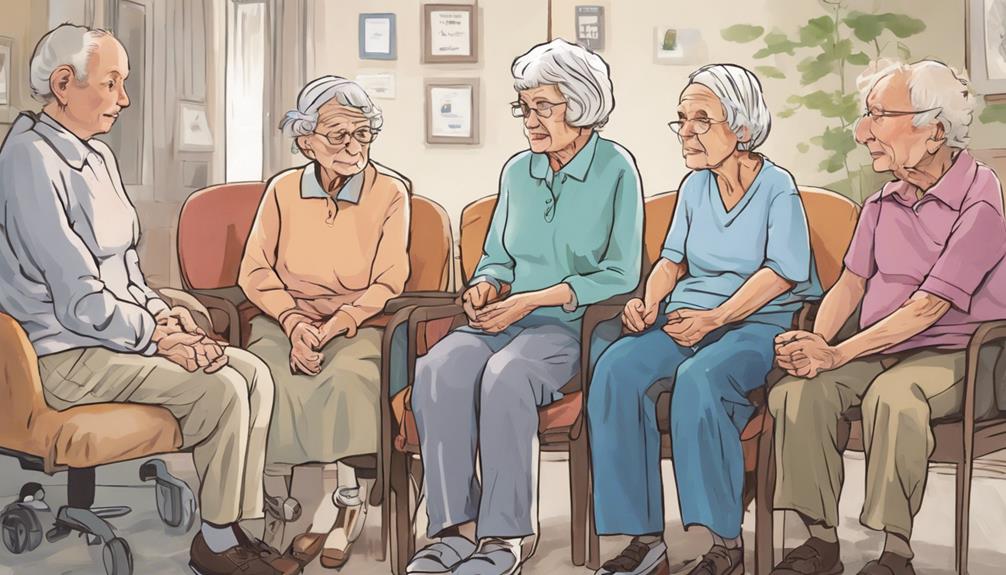Were you aware that as many as 40% of individuals with dementia may encounter challenges with eating at some stage of their condition?
When a loved one with dementia stops eating, it can be a distressing situation that requires careful attention and patience on your part.
Understanding the reasons behind their loss of appetite and exploring creative ways to encourage food intake are just the beginning.
Stay tuned to discover valuable tips on how to navigate this challenging aspect of dementia care with compassion and effectiveness.
Key Takeaways
- Enhance mealtime enjoyment with colorful plates and finger foods.
- Establish consistency and reduce distractions during meals.
- Prioritize comfort and nutrition in meal choices.
- Show patience, compassion, and encouragement in caregiving.
Identifying Potential Reasons for Loss of Appetite
If a loved one with dementia suddenly loses interest in eating, it's essential to explore potential underlying reasons for this change in appetite. Loss of appetite in dementia patients can stem from various factors such as poor oral health, agitation, and changes in the meal environment. In late-stage dementia, the inability to recognize food, changes in the food source, and increased agitation can further diminish their desire to eat.
Poor oral health may lead to discomfort while eating, causing a decline in appetite. Agitation, common in dementia patients, can disrupt meal times and deter them from consuming food. Additionally, changes in the food source or presentation may confuse individuals with dementia, affecting their willingness to eat.
Addressing these factors promptly is crucial. Recognizing and understanding the root cause of appetite loss can help in managing eating challenges in dementia patients effectively. Seeking professional care when necessary, especially when signs of significant weight loss or severe complications arise, is vital for the overall well-being of individuals with dementia.
Encouraging Food Intake Creatively

To creatively encourage food intake in dementia patients, consider using colorful plates or tableware to increase their enjoyment and consumption by 25%. Offering finger foods like fruits, nuts, or small pieces of protein can make it easier for them to eat.
Create a calm and inviting mealtime environment by minimizing distractions and noise, allowing them to focus on their food intake better. Implementing consistent mealtime routines can establish a sense of familiarity and comfort, making the dining experience more pleasant for dementia patients.
Additionally, incorporating omega-3 rich foods like fish into their diet may help lower the risk of brain lesions contributing to dementia. By increasing the appeal of meals through colorful plates, providing easy-to-eat finger foods, and creating a peaceful mealtime atmosphere, you can significantly boost their food consumption and overall well-being.
Prioritizing Comfort and Nutrition
Prioritizing the comfort and nutrition of dementia patients is essential for promoting their overall well-being and enhancing their mealtime experience. When caring for individuals with dementia, creating a soothing environment during meals can help reduce their stress and anxiety, making mealtime more pleasant. Balancing comfort and nutrition is crucial to address challenges like appetite loss. Providing familiar and preferred foods can significantly improve their dining experience, encouraging them to eat more comfortably. This approach supports their health and well-being, ensuring they receive the necessary nutrients. By focusing on both comfort and nutrition, you can help dementia patients feel more at ease during meals and enhance their overall quality of life.
| Comfort | Nutrition | Dementia Patients | Mealtime |
|---|---|---|---|
| Reduce stress | Support health | Enhance well-being | Create calm environment |
| Encourage calm | Balanced diet | Appetite challenges | Offer familiar foods |
| Soothing setting | Necessary nutrients | Preferred meals | Improve dining experience |
Strategies to Reduce Distractions

When creating a calming mealtime environment for dementia patients, it's beneficial to reduce distractions by minimizing background noise and visual clutter. To help your loved one with dementia focus on eating, consider the following strategies:
- Use Plain Tableware: Opt for plain dishes and utensils instead of patterned ones to reduce visual distractions during meals. Simple tableware can help maintain the focus on the food being served.
- Ensure a Quiet Environment: Limit interruptions and loud noises during mealtime to create a calm and quiet atmosphere. By reducing background noise, you can help your loved one concentrate on their food and enjoy the dining experience.
- Choose a Well-Lit Dining Area: Select a well-lit dining space to improve visibility and reduce confusion while eating. Good lighting can enhance the meal environment, making it easier for dementia patients to see their food and feel more comfortable during meals.
Patience and Compassion in Caregiving
As you continue to provide care for a dementia patient who may be struggling with eating, remember that demonstrating patience and compassion is foundational to creating a supportive and nurturing environment. Mealtime can be a challenging experience for individuals with dementia, and your understanding and empathy are crucial in easing their discomfort. By showing patience during meals, you allow the individual the time they need to feel comfortable and supported. Compassion in caregiving is essential, as it helps create a safe space where the dementia patient can relax and enjoy their food.
Your role in providing emotional support during mealtime is vital. Gentle encouragement can go a long way in motivating the dementia patient to eat and maintain proper nutrition. Your caring and understanding approach not only reduces their stress and anxiety but also builds trust and rapport, fostering a sense of security and well-being. Remember, your patience and compassion make a significant difference in creating a positive mealtime experience for the dementia patient.
Frequently Asked Questions
What Do You Do When a Dementia Patient Refuses to Eat?
When a dementia patient refuses to eat, it can be challenging. Try offering small, familiar meals and encouraging hydration with fluids like water or juice.
Create a calm meal environment to reduce stress. Seek advice from healthcare professionals to understand the underlying causes.
How Long Do Dementia Patients Last When They Stop Eating?
When a dementia patient stops eating, the duration they can last varies. Factors like overall health and hydration levels play a role. It's crucial to monitor closely and seek medical advice for proper care.
Hospice care providers and medical professionals can offer support and insights based on the patient's condition. Remember, each individual's situation is unique, so personalized care and attention are essential during this time.
How Do You Encourage Someone With Dementia to Eat?
To encourage someone with dementia to eat, focus on creating a comfortable and appealing dining experience. Use colorful plates and offer finger foods for easier consumption. Maintain a consistent mealtime routine and ensure the food is at the right temperature and easy to chew.
Provide positive reinforcement and encouragement throughout the meal. Remember, 'you can lead a horse to water, but you can't make it drink.' Your support and patience are key in this process.
What Are 4 Interventions for Wandering?
To address wandering in dementia patients, consider implementing environmental modifications like door alarms, utilizing GPS tracking devices, establishing structured daily routines, and providing engaging activities.
Supervision and constant monitoring are crucial to prevent risks associated with wandering behavior.
Seek guidance from healthcare providers or dementia care specialists for personalized interventions.
Conclusion
In conclusion, when a dementia patient stops eating, it's important to approach the situation with patience, creativity, and compassion. Remember the old adage, 'You catch more flies with honey than vinegar.'
By identifying the reasons for their loss of appetite, encouraging food intake in a positive way, prioritizing their comfort and nutrition, reducing distractions, and showing patience in caregiving, you can help ensure the well-being of your loved one.
Stay informed and stay compassionate in your approach.









